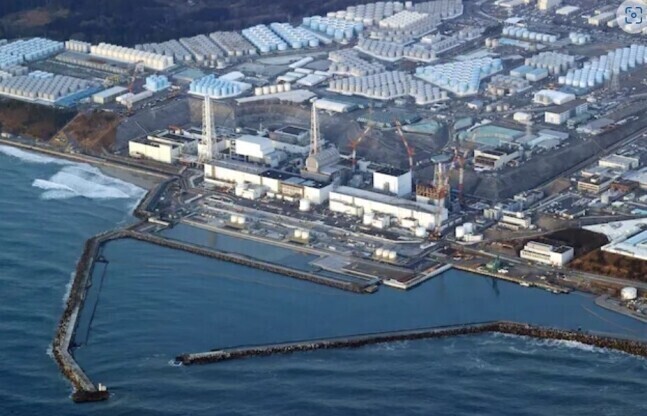hankyoreh
Links to other country sites 다른 나라 사이트 링크
[Correspondent’s column] Denying critical media’s access to Fukushima plant only fuels mistrust


Japan’s planned release of contaminated water stored at the Fukushima Daiichi nuclear power plant into the ocean is fast approaching. The International Atomic Energy Agency (IAEA) published a report on July 4, declaring these plans to be “consistent with relevant international safety standards,” ending all related administrative procedures. As Japan’s release of the contaminated water is likely to occur next month, debates surrounding the water’s safety remain heated.
The lack of transparency and seeming incompetence shown by the Tokyo Electric Power Company (TEPCO) in managing this issue has only fueled mistrust. A crucial factor in judging the safety of the contaminated water lies in the assessment of the effectiveness of the multi-nuclide removal equipment (ALPS) used to remove radioactive substances from the water. Several countries have requested water samples to verify the effectiveness of ALPS, but TEPCO is rejecting these requests without providing any particular explanation. The situation is so dire that even the IAEA has been unable to procure samples directly.
Adding to the concerns is the detection of radioactivity levels above safety standards in certain fish species, such as rockfish and greenlings, caught near the nuclear power plant. TEPCO claims it is unable to pinpoint the exact reason why fish dangerously contaminated with cesium are being caught.
Despite 12 years having passed since the plant’s explosions and meltdowns and the subsequent radioactive leak, questions about TEPCO’s actions since then linger. What on earth is the state of the sea and seabed near the nuclear power plant like? Given these uncertainties, it is no wonder neighboring countries are alarmed by the prospect of TEPCO discharging the contaminated water into the ocean for the next three to four decades.
TEPCO’s irrational behavior does not end there. Earlier this month, the public power corporation, through the Foreign Press Center Japan, accepted applications for on-site reporting by international news outlets at the power plant. This one-day opportunity, scheduled for July 21, seemed like a good chance to inspect the discharge facilities.
The roster of news outlets selected, however, was bewildering. Of all the South Korean newspapers and news agencies that applied, only the Hankyoreh was not chosen. Similarly, only MBC was left out among broadcasters. This is not the first time foreign press has been invited to apply to report on the Fukushima power plant, with similar events held in November of last year, following the end of the COVID-19 pandemic, and in February of this year also via the press center.
Back then, only one Korean media outlet was chosen for each visit, so I had accepted the selection verdict. But this time around, things seem different. Notably, the two media outlets that participated in the previous visits were selected again. When asked about the fairness of the selection process, the press center revealed that the decision was made by TEPCO. The power company, however, has yet to provide a clear response on the issue.
The common thread between Hankyoreh and MBC might be that, compared to other outlets, they have published numerous articles highlighting concerns over the release of the contaminated water. If these major South Korean outlets were excluded simply because they were vocal in their criticism, this cannot be taken lightly. We have officially raised this issue with the South Korean Embassy in Japan, asking them to communicate our concerns to the Japanese Ministry of Foreign Affairs and TEPCO.
It is unusual for Japan, a country that values formality, to overtly exclude foreign media in this way. The only explanation for such a decision is that TEPCO must have believed that nothing significant would come from its actions.
Japan is well aware of the situation in Korea, where journalists critical of the president are excluded from official overseas tours, or where the president skips official press conferences to selectively meet with reporters from his preferred media outlets. IAEA Director-General Rafael Grossi's visit to Korea on July 7 also saw a select few media outlets granted interviews, a stark contrast to his visit to Japan. The freedom of the press, a critical pillar of democracy, is beginning to crumble all around us.
Please direct questions or comments to [english@hani.co.kr]

Editorial・opinion
![[Editorial] Silence won’t save Yoon [Editorial] Silence won’t save Yoon](https://flexible.img.hani.co.kr/flexible/normal/500/300/imgdb/original/2024/0701/681719819632087.jpg) [Editorial] Silence won’t save Yoon
[Editorial] Silence won’t save Yoon![[Column] The miscalculations that started the Korean War mustn’t be repeated [Column] The miscalculations that started the Korean War mustn’t be repeated](https://flexible.img.hani.co.kr/flexible/normal/500/300/imgdb/original/2024/0630/9717197068967684.jpg) [Column] The miscalculations that started the Korean War mustn’t be repeated
[Column] The miscalculations that started the Korean War mustn’t be repeated- [Correspondent’s column] China-Europe relations tested once more by EV war
- [Correspondent’s column] Who really created the new ‘axis of evil’?
- [Editorial] Exploiting foreign domestic workers won’t solve Korea’s birth rate problem
- [Column] Kim and Putin’s new world order
- [Editorial] Workplace hazards can be prevented — why weren’t they this time?
- [Editorial] Seoul failed to use diplomacy with Moscow — now it’s resorting to threats
- [Column] Balloons, drones, wiretapping… Yongsan’s got it all!
- [Editorial] It’s time for us all to rethink our approach to North Korea
Most viewed articles
- 1Japan is building a military meant for more than self-defense — and has the US to thank for it
- 2[Editorial] Silence won’t save Yoon
- 3Yoon’s prosecutors are throwing everything at the president’s opponents to see what’ll stick
- 4NewJeans rocks Tokyo Dome as new, younger generation of K-pop fans emerges in Japan
- 5[Column] The miscalculations that started the Korean War mustn’t be repeated
- 6What made Korea’s lithium battery plant fire so deadly
- 7Dreams of a better life brought them to Korea — then a tragic fire tore them apart
- 8Moscow tells Seoul to rethink ‘confrontational course’
- 9Yoon echoed conspiracy theories about Itaewon disaster, former National Assembly speaker says
- 10Half of South Korea’s conglomerate heirs marry within chaebol community